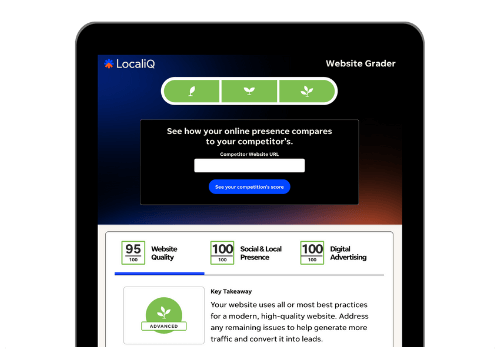You did it! You’ve put time, effort, and resources into getting your business up and running online. But where are your customers? Shouldn’t they be flocking to your new site and clamoring to contact you based on your online presence?
If you’re not seeing the results you hoped for, you may be lacking search visibility.
Search visibility is vital if you want to make sure your customers and prospects are actually finding you online.
In today’s post, we’ll help you build your search visibility and get more customers by uncovering the following:
- What is search visibility?
- What is good search visibility?
- Why is search visibility important?
- How do you improve search visibility?
By the end of this read, you’ll have everything you need to elevate your business in the digital world.

What is search visibility?
If you were looking for a business online, how would you go about it? Chances are, you don’t have their homepage URL memorized, therefore it’s off to the search engines you go to look them up! In short, SEO visibility (a.k.a. search engine visibility or SEO visibility) is a way to gauge how easy it is for people to find your business on a digital search engine, like Google or Bing.
Search visibility is the purpose behind Search Engine Optimization (SEO). SEO is all the marketing tactics you implement to appease the search engine algorithms so that they may show your business organically (for free) on the search engine results page (SERP).

How is search visibility calculated?
As with most things when it comes to Google, no expert is entirely sure exactly what goes into your search visibility calculation or how each factor impacts your score. In general, though, search visibility is a percentage based on the following:
1. How you rank for your targeted keywords
This means if you did show for keywords you’ve targeted through your web content, how high up were you on the SERP? For example, the first organic result ranks number one, and so on.
2. Estimated number of impressions
The search engine’s way of asking “of all the times you could be showing organically for your keywords, how often did someone actually see your listing on the SERP?” Impressions only count if they’re seen by the searcher. So, you first need to rank in order to gain an impression.
3. Expected click-through rate for your keywords
This is the search engine’s estimation of how often someone clicks on your organic result. It’s one thing to rank and get an impression, but the final leg of the search visibility race is pulling in that free click.
For example, if your search visibility score is 0%, that means none of your pages rank high (think the top 50 spots) on the SERP. If your search visibility score is 100% you own all the ranking positions for your keywords (although this score is pretty much impossible—we’ll get into the search visibility score you should shoot for in a bit!).
How can I check my search visibility score?
Imagine how complex the calculation can get as you have to measure different keywords and keyword phrases all with various levels of ranks, impressions, and clicks. Luckily, the math is done for us by the search engines. You can check your search visibility score on free tools like Google Search Console or paid platforms like Ahrefs.

What is good search visibility for your small business?
The tough part is there isn’t any real benchmark guide for search visibility because it varies by industry and individual cases. What we do know is that Google, Bing, and other search giants run a tight ship. In fact, we found it’s rare to see a business with a search visibility score above 40%.
So, even if you start off with a score of 10%, your business is still doing pretty great! Our recommendation is to have an open mind about starting low, track your performance as you go, and as you improve over time, you’ll have a better idea of what’s realistic for your specific business.
Want to know how your website is performing? Try our free website grader to find out.
Why is search visibility important?
Other than making sure people actually see your business on the search engines, search visibility plays a major role in the success of your business both on and offline. Check out these statistics that explain why!
- Nearly 90% of consumers search online before making a purchase either online or in-store.
- 75% of searchers never move on to the second page of search results.
- On average, organic search contributes up to 53% of a business’s overall website traffic.
- 61% of businesses say improving SEO and growing their organic presence is their number one marketing priority.
When you focus on search visibility, not only are you ensuring your presence on the SERP to keep up with the competition, but it’s now more important than ever to rank high and catch searchers with shortened patience (and an ever-changing search results page!).
7 tips to improve search visibility
So you know you want to increase search engine visibility for your business. However, with so many factors playing into your search visibility, it can be tough to know where to begin. We prioritized these seven tips to guide you through the process:
1. Start with basic SEO
It’s no secret that SEO plays the most major role in your search visibility. You don’t have to be an SEO expert to get a head start on optimizations to your web content that will catch the attention of the search engines’ algorithms. Here are a few things a platform like Google or Bing would look for when it comes to your SEO performance:
- Your website is mobile-friendly or responsive.
- You have relevant keywords on your web pages.
- Your pages load at a speedy pace for a streamlined user experience—regardless of what device they’re on.
- You have quality images or videos that also load fast.
- You are reputable.
There are plenty of free online keyword research tools that will help identify what words you should include on your pages, but we’ll get into that later!

To start, try a free landing page tester to get insights on aspects like load time and mobile friendliness. Next, check that your images or videos aren’t blurry or buffering, and note that the smaller the file size the faster it will load. As far as your site being reputable, that’s an SEO component called domain authority. In order to build domain authority, keep consistent, accurate information flowing on your site with reputable sources linked.
2. Create a Google My Business listing
Search visibility goes beyond just the plain, old search results. You can also have organic listings pop up on map views or in the local business listing sections. Setting up a Google My Business profile will allow you to show on these additional listings, therefore boosting your visibility. We know that 64% of consumers use Google My Business to find contact details for a local business, so getting listed here increases your chances of pulling in those high-value leads. It’s free, easy, and only takes a few minutes to get going on Google My Business.

You can follow the steps to create a Google My Business account here.
3. Manage your online reviews
90% of people read reviews before making a purchasing decision. Plus, reviews account for about 15% of the method Google uses to rank local businesses. So, you’ll want to be encouraging your customers to leave reviews, and manage your reviews as they flow in. First, you could offer a referral program to encourage reviews. Next, people spend nearly 50% more with companies that respond to their reviews. So, simply growing and responding to your online reviews will help boost your search visibility efficiently.

Google My Business allows you to create an easy access link for your customers to give reviews. Follow the steps to try it here.
4. Run a PPC campaign
It’s no secret that PPC works hand in hand with SEO. But when you run a PPC campaign you’re ensuring that your business shows up on the SERP via a paid ad. From there, people may see your business then search your brand name or look for that same search again later.
Odds are your target audience isn’t going to convert right away off the first search they do (people need to see information about a business at least seven times to take an action!). So, as you’re trying to grow your SEO visibility, PPC can act as a safeguard to ensure you show one way or another for every search—increasing your overall search visibility.

5. Create keyword-rich content on your website
When you have landing pages, blog posts, articles, studies, guides, FAQs, and more all positioned around your core keywords, it helps build domain authority and provides more opportunities for search engines to index your site on the results pages for relevant searches. This also angles your business as a thought leader which can help you rank for terms outside of just your direct products and services. Conduct keyword research and be sure to include popular keywords on all your site’s pages—from your homepage to the contact page!
Now, you don’t have to go crazy or force it. That would be known as keyword stuffing which will hurt rather than help your search visibility. But Google crawls your site for relevancy to searches, so including your keywords naturally as part of your web content will help give your search visibility a leg up.

A good way to start is by publishing one blog article per week that is centered around an individual target keyword. Each blog’s keyword can connect back to your business’s overall purpose. For example, if your business does bathroom remodeling you might write a blog centered around “replacing sinks,” the next one “installing new tubs,” etc.
Related: Find out how to do local keyword research (+get a free template!).
6. Build a social media presence to trigger searches later
If people can find you on social media, they’ll expect to find you on the SERP as well. Social media is a great way to connect to new audience members since you can post for free. You may be able to access new customers who may not be active on search engines but find you on social media to later look you up on a search engine.
If everyone knew your brand name off the top of their head, it’d be too easy! That’s why leveraging social media posts to spark organic searches later is another hack for increasing your search visibility.

7. Take your search visibility initiatives offline
Like the idea above, you want to also spark an interest that starts offline and eventually moves onto the SERP. Leverage print ads to increase your brand awareness so that people will search for you later. Another low-cost idea is to host events or partake in already planned events in your community to get your name out to the public and onto the SERP. Diving headfirst into offline marketing tactics will trigger people to search for you later—growing your search visibility.

See you on the SERP with your increased search visibility!
The beauty of search visibility is that you can take these low-cost ideas to yield increased ROI. Plus, you’ll be pulling in traffic to your site for free through your newfound organic listings. Search visibility isn’t just a “nice to have” marketing tactic, but a “need to have” for small businesses in today’s world. Put these tips to the test and see your search visibility come to fruition right on the SERP!
Related Articles
-

Google Local Services Ads 101: Everything You Need to Know
-

Updated Search Advertising Benchmarks for 2024 (+Expert Tips to Improve Results)
-

Essential Beginner's Guide to Local PPC
-

9 Reasons Your Google Ads Are Failing (Exclusive Expert Insights!)
-

How Much Does Google Ads Cost in 2024? (+Tips to Lower Costs)



